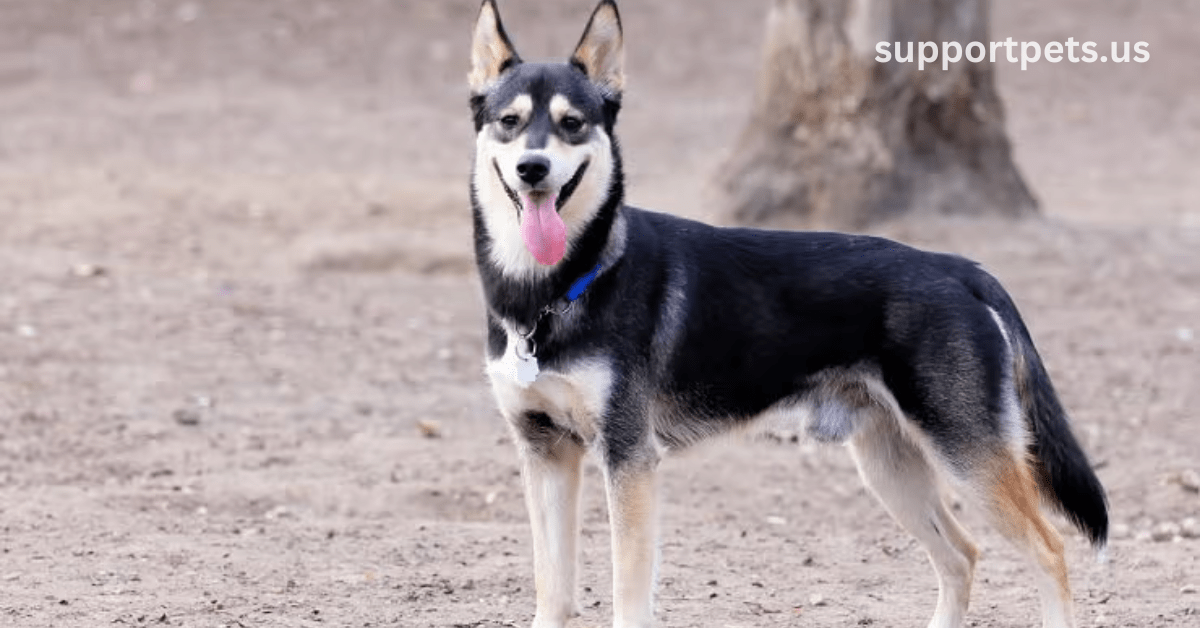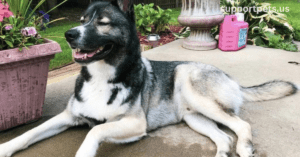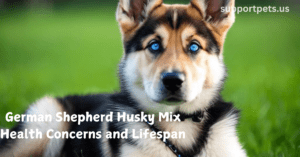The German Shepherd Husky mix, also called the Gerberian Shepsky, is a remarkable hybrid breed. It combines a German Shepherd’s intelligence and loyalty with a Siberian Husky’s endurance and playfulness. These dogs are known for their striking appearance and diverse personalities. Owning a German Shepherd Husky mix requires understanding their unique needs and traits. This breed can make a great companion, but they need proper training, care, and attention. Whether you’re a first-time owner or an experienced dog parent, learning about this mix will help you provide the best environment for your pet.
Appearance and Physical Characteristics of the German Shepherd Husky Mix
This hybrid breed has a striking appearance, often inheriting the best features of both parent breeds. Their coat can vary in color, ranging from black, white, and gray to a blend of these shades. Typically, they have erect ears, a bushy tail, and a muscular, athletic build. The German Shepherd Husky mixes are a medium to large dog, weighing between 45 to 88 pounds and standing 20 to 25 inches tall. Their eyes can be brown, blue, or even bi-colored, adding to their captivating look.
Size and Weight
- Weight: 45-88 pounds
- Height: 20-25 inches
- Coat: Double coat, typically medium length
- Eye color: Brown, blue, or bi-colored
Temperament and Personality Traits
German Shepherd Husky mixes are known for their intelligence, energy, and strong work ethic. They are loyal and protective, traits inherited from their German Shepherd lineage. At the same time, they can be playful and adventurous, thanks to the Husky side. This breed is often highly trainable but requires a firm, consistent owner. They thrive in active households and enjoy being involved in physical activities like running, hiking, or playing fetch. Without enough exercise and mental stimulation, they may become bored, leading to destructive behaviors.
Key Personality Traits
- Intelligent and trainable
- Energetic and playful
- Protective and loyal
- Strong work ethic
- Can be independent and stubborn at times
Training and Socialization Needs
Training a German Shepherd Husky mix can be both rewarding and challenging. Due to their intelligence, they can quickly pick up commands, but their independent streak may require patience. Early socialization is crucial for this breed to ensure they grow into well-rounded adults. They can be aloof with strangers, but proper exposure to different environments, people, and other animals can help mitigate this behavior. Positive reinforcement works best during training sessions. Keep training sessions short, engaging, and varied to maintain their interest.
Essential Training Tips
- Start training and socialization early
- Use positive reinforcement techniques
- Be consistent and patient
- Focus on short, engaging sessions
Care and Maintenance of the German Shepherd Husky Mix
Owning a German Shepherd Husky mixes requires a commitment to regular grooming and exercise. Their thick double coat sheds year-round, with more intense shedding during seasonal changes. Brushing them two to three times a week will help manage the shedding and keep their coat healthy. This breed also needs a lot of physical activity to stay happy and healthy. At least one to two hours of exercise per day is recommended, including walks, runs, or playtime in a secure yard.
Grooming and Coat Care (German Shepherd Husky mix)
- Brush 2-3 times per week
- Increased shedding during seasonal changes
- Regular nail trimming and ear cleaning
- Bathe only when necessary
Read More: Can Dogs Eat Raw Chicken? A Comprehensive Guide
Health Concerns and Lifespan
Like all breeds, the German Shepherd Husky mix is prone to certain health issues. Hip dysplasia, elbow dysplasia, and eye conditions are common concerns for this breed. Regular vet check-ups, a balanced diet, and proper exercise can help maintain their overall health. The average lifespan of a German Shepherd Husky mixes is between 10 to 14 years. By ensuring they get the right care and attention, you can help your dog lead a long, happy life.
German Shepherd Husky mix Common Health Issues
- Hip and elbow dysplasia
- Eye conditions (cataracts, progressive retinal atrophy)
- Regular vet check-ups recommended
Diet and Nutrition for a German Shepherd Husky Mix
Providing the right diet is essential for maintaining the health and energy levels of a German Shepherd Husky mix. Due to their high energy and active nature, they require a well-balanced diet rich in protein, healthy fats, and essential vitamins. The right diet should be tailored to their age, weight, and activity level. Typically, high-quality dry kibble formulated for large, active breeds is a good choice. Avoid overfeeding, as this breed can be prone to obesity if their diet is not managed correctly. Ensure they have access to fresh water at all times, especially after exercise.
Key Nutritional Guidelines
- Protein-rich food for muscle maintenance
- Healthy fats for energy
- Age and weight-appropriate portions
- Avoid overfeeding to prevent obesity
- Fresh water available at all times
Exercise Needs of the German Shepherd Husky Mix
This hybrid breed is highly energetic and requires regular exercise to stay happy and healthy. Daily physical activity is crucial for preventing boredom and destructive behavior. The German Shepherd Husky mix thrives on activities that engage both their mind and body, such as running, hiking, or agility training. Mental stimulation is equally important, as this breed loves to solve problems and take on challenges. Without sufficient exercise, they may develop behavioral issues such as excessive barking, chewing, or digging. A daily routine of at least 60 to 120 minutes of exercise is ideal for this breed.
Types of German Shepherd Husky mix Exercise
- Daily walks or runs (minimum 60 minutes)
- Hiking or agility training
- Mental stimulation (puzzle toys, obedience training)
- Playtime in a secure yard
Social Interaction and Compatibility with Families
The German Shepherd Husky mix is a loyal and protective dog that bonds closely with its family. They are generally good with children, especially when raised with them, but due to their size and energy, supervision is always advised. This breed is also known to get along well with other dogs, especially when socialized early. However, their prey drive may make them less suitable for households with smaller pets like cats or rabbits. These dogs thrive in an active, engaged family environment and should not be left alone for long periods, as they may become anxious or destructive.
Family Dynamics
- Loyal and protective of family
- Good with children (with supervision)
- Early socialization with other pets is crucial
- May have a high prey drive towards small animals
- Needs an active, engaging household
Living Environment and Space Requirements
The German Shepherd Husky mix needs ample space to move and play. They are not well-suited to apartment living unless they have a highly active outdoor routine. A home with a large yard is ideal, allowing them to burn off energy and satisfy their natural instincts to roam and explore. This breed is known for being escape artists, so it’s important to have a secure, fenced-in area to prevent them from wandering off. While they enjoy outdoor time, they also need indoor space where they can relax with their family. A balance between outdoor activity and indoor companionship is key.
Ideal Living Conditions
- Best suited for homes with a large, secure yard
- Not ideal for small apartments without outdoor access
- Enjoys a balance of outdoor and indoor time
- Needs a fenced area to prevent wandering
Common Behavioral Traits to Watch For
While the German Shepherd Husky mix is an intelligent and loving breed, they can exhibit challenging behaviors if not properly trained and exercised. Their independence, inherited from the Husky side, can sometimes make them stubborn and difficult to control. They are also prone to separation anxiety if left alone for extended periods. Destructive behaviors, such as chewing or digging, can occur when they are bored or under-stimulated. Providing them with enough physical and mental activity, as well as consistent training, is crucial to keeping their behavior in check.
Common Behavioral Challenges
- Stubbornness and independence
- Separation anxiety when left alone
- Destructive behavior when bored (chewing, digging)
- Tendency to escape if not properly secured
- Consistent training and mental stimulation are essential
Is the German Shepherd Husky Mix Right for You?
Before deciding to bring a German Shepherd Husky mix into your home, consider whether their needs match your lifestyle. This breed is best suited for active individuals or families who have the time and energy to meet their exercise and training needs. They thrive in environments where they are given plenty of physical and mental stimulation, and they enjoy being part of a family’s daily activities. If you can provide the necessary attention, space, and training, the German Shepherd Husky mixes can be a loyal, energetic, and loving addition to your household.
Factors to Consider
- Active lifestyle required
- Need for daily exercise and training
- Requires mental stimulation and engagement
- Suitable for homes with space to roam
- Great family dog with proper training
FAQs
1. How much does a German Shepherd Husky mix cost?
The cost of a German Shepherd Husky mixes typically ranges from $400 to $1,200, depending on the breeder, location, and lineage. Adoption fees are generally lower.
2. What is the temperament of a German Shepherd Husky mix?
This mix is intelligent, loyal, and energetic. They are protective but friendly, making them excellent companions when properly trained and socialized.
3. How much exercise does a German Shepherd Husky mix need?
The German Shepherd Husky mix requires at least 1 to 2 hours of exercise daily. This includes activities like running, hiking, or interactive play to stay mentally and physically stimulated.
4. What are the grooming needs for a German Shepherd Husky mix?
This breed has a thick double coat that sheds heavily, requiring regular brushing. Bathing is necessary occasionally, while ears and nails need frequent checking.
5. Are German Shepherd Husky mixes good with families?
Yes, they are generally good with families, especially active ones. Early socialization is key for them to behave well with children and other pets.
Conclusion:
Owning a German Shepherd Husky mix can be an incredibly rewarding experience for the right owner. This breed offers a unique combination of intelligence, loyalty, and energy that makes them a joy to be around. However, they do require time, patience, and commitment to ensure they are properly cared for. With the right training, socialization, and attention to their physical and mental needs, the German Shepherd Husky mix will become a cherished member of your family. Their striking appearance and loyal companionship make all the effort worthwhile.












